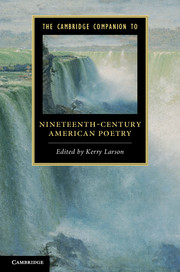Book contents
- Frontmatter
- Introduction
- I MANDATES, MOVEMENTS, AND MANIFESTOES
- 1 The reception of nineteenth-century American poetry
- 2 American Indian poetry in the nineteenth century
- 3 The poet as Poetess
- 4 Transcendentalist poetics
- 5 Slavery and its metrics
- 6 Weathering the news in US Civil War poetry
- 7 The “Twilight of the Poets” in the era of American realism, 1875–1900
- II INDIVIDUAL AUTHORS
- Selected guide to further reading
- Index
- Cambridge Companions to…
5 - Slavery and its metrics
from I - MANDATES, MOVEMENTS, AND MANIFESTOES
Published online by Cambridge University Press: 28 November 2011
- Frontmatter
- Introduction
- I MANDATES, MOVEMENTS, AND MANIFESTOES
- 1 The reception of nineteenth-century American poetry
- 2 American Indian poetry in the nineteenth century
- 3 The poet as Poetess
- 4 Transcendentalist poetics
- 5 Slavery and its metrics
- 6 Weathering the news in US Civil War poetry
- 7 The “Twilight of the Poets” in the era of American realism, 1875–1900
- II INDIVIDUAL AUTHORS
- Selected guide to further reading
- Index
- Cambridge Companions to…
Summary
Lucy Terry (c. 1730–1821) has long been credited – not without good reason – as the first known African-American author, and her one surviving work, the poem “Bars Fight” (c. 1746), is widely anthologized as the earliest surviving poem by an American slave. The story of the poem's survival – composed by Terry shortly after an Indian raid on Deerfield, Massachusetts, in 1746, and preserved and transmitted through memorization and recitation until its first known publication in 1855, over thirty years after her death – is a highly plausible, but by no means indisputable, combination of legend and painstaking scholarship. The relation of the 1855 text to the original composition and its subsequent iterations is not definitively known. Readers of “Bars Fight” have continued to pursue the poem back to its likely but obscure origins in the versifying practice of a teenaged slave who had been kidnapped from Africa to New England as a young child and who was remembered and praised down the generations as a witty storyteller and skilled poet. It is the poem's pursuit of Terry that interests me here.
- Type
- Chapter
- Information
- Publisher: Cambridge University PressPrint publication year: 2011
- 3
- Cited by

